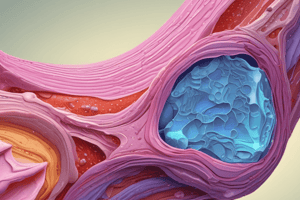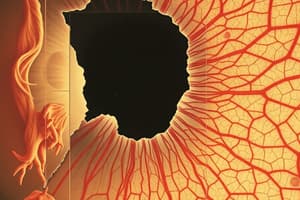Podcast
Questions and Answers
What is a primary structural characteristic of Dense Irregular Connective Tissue?
What is a primary structural characteristic of Dense Irregular Connective Tissue?
- Regularly arranged collagen fibers
- Almost entirely composed of adipose cells
- Thick collagenous bundles woven irregularly (correct)
- Branching elastic fibers arranged in a parallel manner
Which cell type is responsible for producing collagen in Dense Irregular Connective Tissue?
Which cell type is responsible for producing collagen in Dense Irregular Connective Tissue?
- Chondrocytes
- Fibroblasts (correct)
- Adipocytes
- Osteocytes
What role does Dense Irregular Connective Tissue play in the body?
What role does Dense Irregular Connective Tissue play in the body?
- Serves primarily as a heat insulator
- Acts as a packing material between various body structures (correct)
- Produces blood cells
- Provides rigid support and storage of calcium
In which locations can Dense Irregular Connective Tissue be found?
In which locations can Dense Irregular Connective Tissue be found?
Which type of connective tissue contains branching elastic fibers arranged parallel to each other?
Which type of connective tissue contains branching elastic fibers arranged parallel to each other?
What are the primary substances produced by mast cells?
What are the primary substances produced by mast cells?
How are mast cells described based on their size and characteristics?
How are mast cells described based on their size and characteristics?
What role do connective tissues like loose connective tissue play?
What role do connective tissues like loose connective tissue play?
How is general connective tissue categorized?
How is general connective tissue categorized?
Where are mast cells primarily originated?
Where are mast cells primarily originated?
What effect does histamine have on blood vessels?
What effect does histamine have on blood vessels?
In the context of connective tissue, what is ground substance responsible for?
In the context of connective tissue, what is ground substance responsible for?
What can loose connective tissue be classified based on?
What can loose connective tissue be classified based on?
What is the primary structural characteristic of Dense Regular Connective Tissue?
What is the primary structural characteristic of Dense Regular Connective Tissue?
Where is Elastic Connective Tissue primarily located?
Where is Elastic Connective Tissue primarily located?
Which statement accurately describes the composition of Reticular Connective Tissue?
Which statement accurately describes the composition of Reticular Connective Tissue?
What is the role of fibroblasts in Dense Connective Tissue?
What is the role of fibroblasts in Dense Connective Tissue?
Which type of collagen is primarily associated with the support of organs in Reticular Connective Tissue?
Which type of collagen is primarily associated with the support of organs in Reticular Connective Tissue?
Elastic fibers in Elastic Connective Tissue can stretch up to what percentage of their resting length?
Elastic fibers in Elastic Connective Tissue can stretch up to what percentage of their resting length?
What distinguishes Dense Connective Tissue from Loose Connective Tissue?
What distinguishes Dense Connective Tissue from Loose Connective Tissue?
Which connective tissue type is characterized by a high concentration of ground substance and is important for nutrient exchange?
Which connective tissue type is characterized by a high concentration of ground substance and is important for nutrient exchange?
Flashcards are hidden until you start studying
Study Notes
Dense Irregular Connective Tissue
- Provides support to ligaments, tendons, and rigid structures like bone and cartilage.
- Contains thick collagen bundles woven into a meshwork for stress resistance, allowing tensile strength from multiple directions.
- Plays a role in repair and scar tissue formation post-injury.
- Houses elastic fibers and various cells including fibroblasts, mast cells, macrophages, and plasma cells, contributing to defense mechanisms.
- Serves as a storage site for fats and calcium in bones.
- Found in locations such as dermis of skin, sheaths of nerves, capsules of spleen, testes, ovaries, kidneys, and lymph nodes.
- Acts as packing material between epithelia, muscles, and glands.
Dense Regular Elastic Connective Tissue
- Composed of branching elastic fibers arranged in parallel with few collagen fibers.
- Located in large blood vessels, ligamentum flava of the spine, and suspensory ligament of the penis.
Mesenchyme (Embryonic Connective Tissue)
- Characterized by loose, spongy tissue that forms packing between structures during embryonic development.
- Originates in bone marrow and circulates as monocytes before performing roles in connective tissue.
Mast Cells
- Large, ovoid cells (20-30 μm) containing granules filled with substances.
- Cytoplasm includes heparin (an anticoagulant) and histamine (increases capillary permeability and causes vasodilation).
Classification of Adult Connective Tissue
- General connective tissue is split into loose or dense categories based on fiber packing.
- Loose connective tissue (areolar) can be further classified based on constituent properties.
Reticular Connective Tissue
- Forms delicate networks providing support to various organs.
- Contains type III collagen within loose connective tissue.
- Found in embryonic connective tissue, around adipose and smooth muscle cells, and supporting mesh in liver, lymph nodes, and spleen.
Elastic Connective Tissue
- Consists of loose bundles of elastic fibers interspersed with collagen and cartilage.
- Elastic fibers can stretch up to 150% of their resting length.
- Present in dermis, lungs, elastic cartilage, and large blood vessels.
Dense Connective Tissue
- Contains more fibers, fewer cells, and lesser matrix than loose connective tissue.
Dense Regular Connective Tissue
- Features parallel arrangement of fibers, providing tensile strength in a single direction.
- Fibroblasts align in rows parallel to collagen bundles, with minimal ground substance.
- Commonly located in tendons, ligaments, and aponeuroses.
Functions of Connective Tissue
- Transports blood vessels and lymphatics, facilitating exchange of nutrients, wastes, and gases between tissue and blood.
Studying That Suits You
Use AI to generate personalized quizzes and flashcards to suit your learning preferences.




